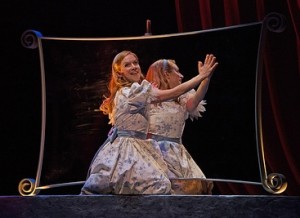Stratford Festival
Festival Theatre
Written by George Farquhar
Directed by Antoni Cimolino
Approximate running time: 2 hours and 36 minutes (with one 15 minute interval)
August 15-September 20
Toll-free: 1.800.567.1600
519.273.1600
Festival Theatre
Written by George Farquhar
Directed by Antoni Cimolino
Approximate running time: 2 hours and 36 minutes (with one 15 minute interval)
August 15-September 20
Toll-free: 1.800.567.1600
519.273.1600
STRATFORD – After opening the season on such a magnificently
tragic note with Colm Feore’sKing
Lear, it seems only fitting to debut the last show for 2014
featuring the same splendid actor showcasing his considerable comic skills in a
theatrical laugh fest.
That’s exactly what happened Friday night with the
opening of George Farquhar’s feast of chuckles and belly laughs, The
Beaux’ Stratagem, one of the last great Restoration comedies
and an endlessly witty satire that playfully pokes fun at all classes of
society but with a sense of gentility and almost kindness.
For those unable to figure out the basic plot in
the brief moments between the cascades of rapid-fire dialogue, pratfalls,
stereotypical drunken husbands and some wildly outrageous sight gags, here it
is in the proverbial nutshell:
Archer (Colm Feore) and Aimwell (Mike Shara), two
fashionable young 18th Century gents posing as servant and master, have fallen
on hard times. They plan to travel through small towns, entrap young heiresses,
take their money and quickly move on. But there is a single but plot-altering
snag in the first stop they make.
In the first town on their nefarious journey,
Lichfield, they target Dorinda (Bethany Jillard) but as fate as would have it,
Aimwell falls in love with her, dismaying Archer, who has his eyes on the
wealthy Mrs. Sullen (Lucy Peacock).
The storyline, top heavy with genuinely funny
interplay between all cast members and with its comic twists and turns, almost
seems secondary to the company’s masterful performances. Director Antoni
Cimolino’s pacing has the production’s two hours and 36 minutes seeming more
like an hour of non-stop brilliant silliness and hilarity.
You leave starved for more.
With his legs sharply shooting out into space from
the effects of the powerful ale selected by the chatty but suspicious landlord
Will Boniface (Robert King), Shara brings down the house with his mastery of
physical and verbal humour.
Feore, fresh from his heart-wrenching portrayal of
Lear, shows he’s no slouch when it comes to broad and more subtle comedy,
chewing up and spitting out his dialogue at an earth shattering speed. Peacock,
unhappy in love, is delightful as she jousts with her oft-time drunken
disinterested hubbie, Squire Sullen, brought to life by the wonderful Scott
Wentworth.
Yet, in spite of the first rate work from the
aforementioned leads, the play’s hands-down scene stealer is clearly the
multi-talented Martha Henry, whose sword wielding Lady Bountiful is simply
brilliant and guaranteed to lighten up even the most sombre of audience
members. It is a character to remember well past the evening’s end.
To prove that even secondary characters can grab
their share of the guffaws, Gordon S. Miller as the annoyingly ever-present
Scrub turns the simple act of a cowardly retreat into an art, complete with an
awe-inspiring leap from the floor into a bed, wrapping himself like a cocoon
with one swift grab at the bed linen.
This was a magical night of comedy. Hats off to
Cimolino and a picture perfect cast. This is how comedy is done properly.
5 out of 5 stars









